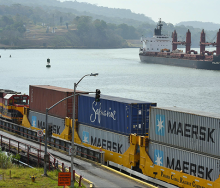The City of uMhlathuzi has announced plans to employ police reservists to assist in managing the congestion of coal trucks approaching the Port of Richards Bay.
The council revealed on Tuesday that the recruitment will be on a fixed-term basis, and the reservists will commence their service next week.
This move will allow on-duty officers to return to their assigned traffic duties, from which they have been temporarily diverted to assist in the management of the line of tipper trucks on the N2, often queuing for distances exceeding 10 kilometres.
This backlog affects the John Ross access road to the port and southbound traffic on the highway.
The council has stated its intention to seek legal redress against entities that are aggravating the trucking chaos that has come to define the transportation of heavy-haul road freight to the port.
Intervention measures encompass various initiatives, including efforts to compel the restoration of rail freight, a reduction in the number of tipper trucks transporting coal to the port, improvements in commodity volume processing at the coal terminal, enhancements in occupational health, and the potential implementation of an overtime surcharge to cover the city's costs for performing a non-core function on an ongoing basis.
A council statement said: "We appreciate the public's attention to this matter, and we will continue to provide updates on our efforts to alleviate the challenges posed by truck congestion in our city."
The congestion has been a significant issue for uMhlathuzi authorities, causing frustration and anger among businesses and residents.
Complaints from the Richards Bay community include difficulties in accessing certain suburbs, road damage caused by the substantial volume of coal transported to the port, and coal dust becoming airborne when the wind blows.
Additionally, the port's rail capacity is reported to still be hindered by a fire that damaged a conveyor belt used for bulk-loading coal onto vessels.
This fire, which Transnet had confirmed as sabotage, occurred in October 2021 and played a significant role in the increased use of road transport for coal.
It is estimated that mines in the coal-rich regions of southern Mpumalanga and northern KwaZulu-Natal employ approximately 1800 tippers each day for the transportation of coal to the port.













